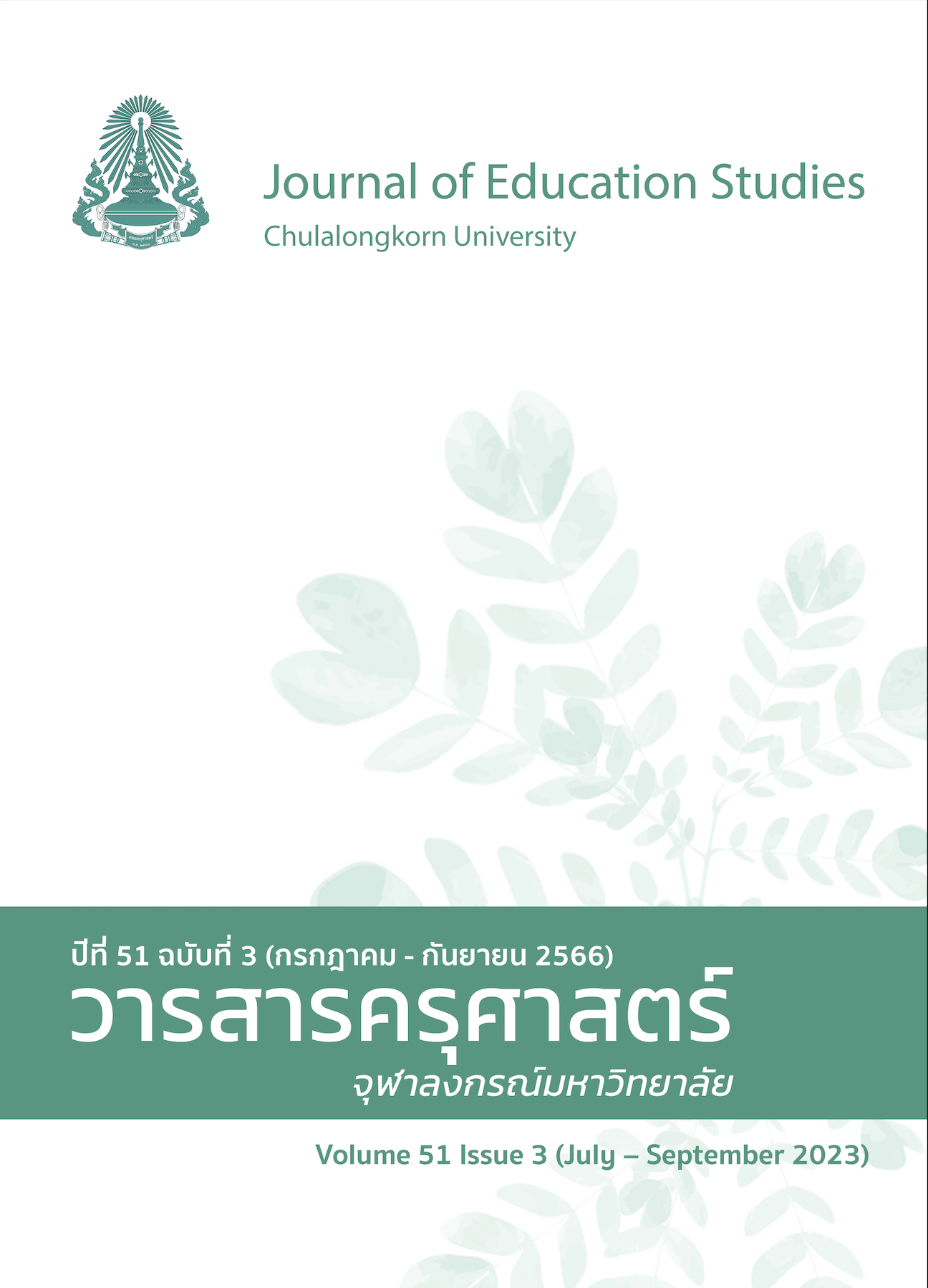The Development of the Credit Bank System Mechanism Model for the Management of Lifelong Learning Education at Chiang Rai Rajabhat University
The Development of the Credit Bank System Mechanism Model for the Management of Lifelong Learning Education at Chiang Rai Rajabhat University
DOI:
https://doi.org/10.14456/educu.2023.25Keywords:
ThaiAbstract
The objective of this research was to develop the mechanism model for driving the credit bank system for the management of lifelong learning education at Chiang Rai Rajabhat University. There was a sample group of 22 people consisting of experts in lifelong education management, executives of Chiang Rai Rajabhat University, deans of all faculties, colleges, schools, and directors of work related to the lifelong education system. Method of conducting research by studying, analyzing, and collecting information on principles, concepts, and developments of foreign and domestic credit accumulation systems. The results of the study were then used to develop a mechanism for driving the banking system and to accumulate learning results for lifelong learning management at Chiang Rai Rajabhat University. The research findings revealed that:
The mechanism model for driving the credit bank system for the management of lifelong learning education at Chiang Rai Rajabhat University consists of 1) Curriculum preparation system credit accumulating 2) Student admissions system 3) Learning management system 4) Monitoring and evaluation system
5) Credit bank database recording system for accumulating learning outcomes 6) Approval system
7) Certificate of learning results system. There is a manual with operational processes that provide a guide for driving a lifelong learning cooperation network to become a partner in a particular cooperation network. This includes a pilot experiment to develop a curriculum to accumulate learning outcomes and an experiment to adopt a credit bank system at Chiang Rai Rajabhat University.
References
พัชราภา ตันติชูเวช. ผลการทดลองใช้ระบบการสะสมหน่วยการเรียนรู้ (Credit Bank System) เพื่อพัฒนาคุรภาพและยกระดับการศึกษาขั้นพื้นฐานของผู้ผู้เรียน.วารสารบัณฑิตศึกษา มหาวิทยาลัยราชภัฏสวนสุนันทา . ปีที่ 11 ฉบันที่ 2 กรกฏาคม-ธันวาคม 2561, 98
ภูษณิศา นวลสกุล. (2556). บทสรุปการสัมมนาทบทวนปรัชญาการศึกษาทั่วไป. โครงการสัมมนาทบทวนปรัชญาการศึกษาทั่วไป เครือข่ายการศึกษาทั่วไปแห่งประเทศไทย. เมื่อวันที่ 21 มิถุนายน 2556 ที่โรงแรม Prince Palace : กรุงเทพฯ.
วราภรณ์ สีหนาท. (2557). การจัดการศึกษาระบบธนาคารหน่วยกิตในระดับอุดมศึกษา. อนุสารอุดมศึกษา. ปีที่ 40(438), ธันวาคม 2557, 14 – 15.
สำนักงานเลขาธิการสภาการศึกษา. (2558). รายงานการวิจัยแนวทางพัฒนาระบบการสะสมหน่วยการเรียนรู้ (Credit Bank System) ระดับการศึกษาขั้นพื้นฐาน. กรุงเทพฯ: เซ็นจูรี.
อรุณี ตระการไพโรจน์. (2561). ระบบธนาคารสะสมผลการเรียนรู้สำหรับการศึกษาตลอดชีวิตของประเทศไทย. วิทยานิพนธ์ศึกษาศาสตรดุษฎีบัณฑิต สาขาวิชาการจัดการการศึกษา วิทยาลัยครุศาสตร์. กรุงเทพฯ: บัณฑิตวิทยาลัย มหาวิทยาลัยธุรกิจบัณฑิตย์.
อัญชลี ธรรมะวิธีกุล. 2555). การส่งเสริมการเรียนรู้ตลอดชีวิต: กรณีศึกษาในต่างประเทศ. วารสาร กศน. กรุงเทพฯ : นำทองการพิมพ์จำกัด.
อุทัย บุญประเสริฐ. (2560). ธนาคารหน่วยกิต ระบบธนาคารหน่วยกิต การเทียบโอนและการสะสมหน่วยกิตหรือผลการเรียนรู้. กรุงเทพฯ : มหาวิทยาลัยธุรกิจบัณฑิตย์.
European Union. (2015). ECTS users’ guide 2015. Luxembourg: Publications Office of the European Union.
Fowler, M., & Lunar, G. (2009). High School and College Partnerships: Credit Based Transition Programs. American Secondary Education, 38(1). Pp. 62-67.
Kee Youngwha & Zhang Rui. (2009). Credit bank system: what has been saved for ten years of educational quality. Soongsil University. Seoul Korea.
Kim, Junghwan., Park, Hyewon., Kwon, In Tak., & Yu, Pyeong Su. (2014). Critical Review of Credit Bank System in South Korea: A New Mediator for Lifelong Learning?. Adult Education Research Conference.
Medel-Anoneuvo et al. (2001). Revisiting lifelong learning for the 21 st century. UNESCO Institute for education.
Tan, C. (2016). Lifelong Learning Through the Skills Future movement in Singapore: Challenges and prospects.
UNESCO. (2014). Republic of Korea case study: Education Sector – The Academic Credit Bank System. Institute for Lifelong Learning.
UNESCO. (2015). The UNESCO Global Network of Learning Cities welcomes 54 new member cities from 27 countries. Retrieved February 23, 2022, from https://uil.unesco.org/ lifelong-learning/learning-cities/unesco-global-network-learning-cities-welcomes-54-new-member.
Usher, Alex. (2014). The Korean academic credit: A model for credit transfer in North America?. Toronto: Higher Education Strategy Associates.
Downloads
Published
How to Cite
Issue
Section
License

This work is licensed under a Creative Commons Attribution-NonCommercial-NoDerivatives 4.0 International License.




